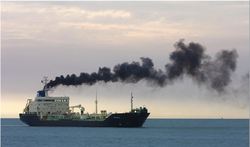Shipping sector faces ‘huge challenge’ to tackle emissions

Seaborne trade is expected to grow and with it international shipping. As GHG emissions from the industry are expected to rise accordingly, the International Transport Forum foresees emissions could jump at least 60% by 2050 without new policies.
ITF ports and shipping administrator Olaf Merk explains shipping will need a mixture of measures to decarbonize.
EMISSIONS UNDER A BUSINESS-AS-USUAL SCENARIO COULD CLIMB 160% BY 2050.
THE increase in shipping emissions caused by a projected threefold increase in trade by 2050 requires the quick introduction of decarbonisation measures, according a shipping experts at the Organisation for Economic Co-operation and Development.
A report by the OECD’s International Transport Forum this week explored what a jump in freight trade will mean for emissions from the different transport sectors, finding that even if the global economy largely divests from fossil fuels, shipping emissions could jump by 60% if regulators do not introduce mitigation policies.
On the other hand, under the ITF’s “current ambition” — or business-as-usual scenario, there could be a 160% increase in shipping’s carbon emissions by 2050.
“It shows there is a huge challenge, a huge gap, between the demand and the targets to be realised,” said Olaf Merk. “There is a lot of additional policies that will be needed.”
The International Maritime Organization, which recently strengthened energy efficiency requirements for new ships, has yet to take any new measures to curb emissions, since adopting a greenhouse gas strategy last year, despite proposals on speed limits, technical and operational efficiency measures.
Asked whether he believes any of the floated measures more than others, Mr Merk said he does not want to prejudge them but emphasised that there has to be a mixture of measures that target operations and the uptake of alternative fuels.
“I just think it is important that it is measures that will be introduced quickly,” he told Lloyd’s List.
Under the IMO’s current plan, short-term reduction measures have to be introduced by 2023.
Aside from regulations, there is wide recognition from across the industry that innovative technologies and fuels will be needed to decarbonise shipping.
Mr Merk said he sees promising efforts to this end, albeit in a smaller scale for the time being
“It seems to me there is lot happening on the ground by entrepreneurs that are piloting new things,” he said.
The difficulty, he said, is translating the momentum of those apparent efforts into a global regulation that can prevent the sector from meeting those two ITF emissions projections.